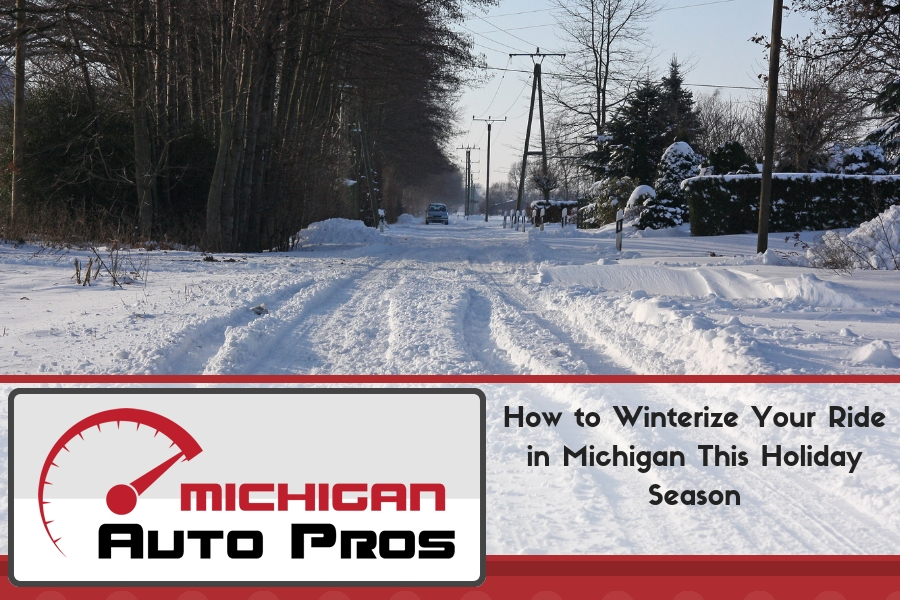As temperatures plummet here in Michigan, vehicle maintenance takes a back seat to turkey and good tidings. Truth is, winter is the most important time to service your vehicle. From inconvenient to downright treacherous, driving in winter weather takes a toll on both drivers and their cars. There are several things you can – and should – do to keep your car in top condition this winter without dipping into your holiday savings. Read on and learn how to get your car ready for the coldest season of the year.
Be Prepared
This may seem obvious but preparing your car ahead of Mother Nature’s icy grip will pay dividends when the sleet and salt start to fly. Make sure you always have a quality ice scraper and brush on hand. Check the condition of your windshield wipers and make sure they’re in good working order. Cracked, bent, or otherwise worn wipers should be replaced. While you’re at it, top off your windshield wiper fluid. Depending on where you live, the climate may require the use of a de-icer. It’s never a bad idea to stock up on an extra jug or two of washer fluid, either. You might be surprised to stumble upon a bare shelf at your local convenience store during particularly inclement weather.

Thumb through your car’s owner’s manual and make note of any oil recommendations. Many times, your standard oil will be fine. But in particularly frigid temperatures, you may need to switch to an oil of a lesser viscosity. As oil becomes hot, it becomes thinner. During the summer months, a higher-viscosity oil makes sense, as it will inevitably thin as it gets up to working temperature. During the winter, you may benefit from a lower viscosity (and thus, thinner) oil as it’s not going to be subjected to the same high temperatures. Check with your local service center if your car’s manual doesn’t answer the questions you may have.
Depending on the quality and age of your car’s battery, you might want to consider getting a new one, or at least ensuring the one you have is properly charged. Many batteries are measured in cold-cranking amps, or CCA’s. The higher the CCA’s, the more reliable the battery is going to be when you go to start your car on a cold winter morning. As the warmer months wane, if your car seems sluggish to start when temperatures dip into the 40’s, you should get your battery checked ahead of the cold.
Know What to Do in An Emergency
While your car’s health is vital, your own safety takes priority above all else. Winter driving can be potentially dangerous, and not just because of snow and ice. Ensuring your car is in good working order is critical to reducing the chances of an emergency. However, responsible drivers should be prepared for all situations. While a dead battery or stalled car can be a headache in a suburban area where there are plenty of places to take shelter, it could create a dangerous scenario on remote roads where help is distant, and the temperatures are in the single digits. A first aid kit, spare tire, flares, flashlights, warm clothes, and one or more blankets are items motorists should always consider having in their vehicle. Compact battery-powered jump-starters can often double as cell phone chargers in an emergency, and a small air compressor can help get a dangerously low tire inflated enough to get to a service center. Establish your safety protocol before the cold sets in, and drive with confidence all winter long.
Inspect Your Tires
You wouldn’t wear a pair of gym shoes to hike a snowy trail, and the same goes for your car’s footwear. While you can brave the winter on sporty, low profile tires, it isn’t a good idea. Many drivers choose to outfit their car with snow tires. Snow tires sport aggressive treads, and some may even feature micro spikes – small studs that help them cling to the road in even the iciest conditions. Snow tires can result in more road noise, and decreased fuel economy, but this is often seen as a fair trade for enhanced traction and confidence while navigating wintry conditions.
Even if you choose to run your standard tires through the winter, giving them a careful onceover is vital. Check your tread depth, and for any dry rotting or leaks. It’s not only punctures that can cause a tire to lose air. The valve stems (and the valves inside of them) can eventually wear out and result in a slow loss of pressure. Some drivers may choose to run slightly less pressure in their tires, as it can potentially result in better traction. Less pressure may allow more of the tire to contact the irregularities presented by winter road conditions. Be careful should you choose to do this; a little goes a long way, and a tire inflated below spec is prone to wear faster. Contact a service professional if you have any questions.
Examine Your Vehicle’s Exterior
The winter weather is brutal on a vehicle. If you have any rust, or loose components on your car’s undercarriage, you might want to consider getting them repaired before snowfall. Sand and salt used to combat slippery conditions will do a number on your car. Any rusted areas (especially exhaust components) will only get worse if not addressed. At the minimum, be sure to get your car washed more frequently, and always opt for the undercarriage service. If your headlights are glazed over, they can be repaired to their normal transparency either by using a kit sold at most auto parts retailers, or for a small fee at a service center. You want maximum visibility during inclement weather.
Some door locks are prone to freezing in extreme conditions. If you live in an area where temperatures can get well below freezing, prepare for frozen locks and keep de-icer, or even cooking spray handy. These can be sprayed into the lock to quickly thaw ice. In a pinch, a common propane blowtorch or even a lighter may work, but tread lightly when taking a flame to your car.
Winterizing your vehicle doesn’t need to be expensive or challenging but neglecting these few simple steps can spell disaster down the road. The technicians at Good Care Auto are standing by to help you have a safe, memorable, and hassle-free holiday season. They stock a range of winter-grade wipers, washer fluid and snow tires and are happy to assist you. Advice is free, so if you’re planning for the winter months, give Good Care Auto a call at (734) 285-1188 and let them help you prepare your car for the road ahead.
